Olympic relocations: Beijing, London 2012 and Rio
- Published
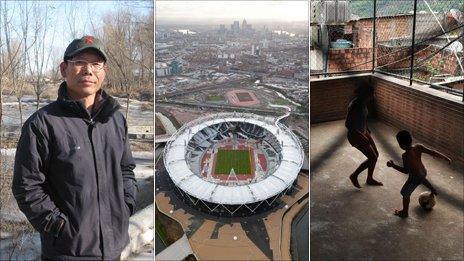
As London gears up to host the 2012 Olympic Games, the BBC World Service has travelled from East London, to Beijing (Olympics 2008), to the favelas of Rio (Olympics 2016), to find out how the lives of those living and working closest to the stadiums have been affected.
Beijing - Ye Guoqiang, activist for housing rights
I was detained, together with my elder brother and other members of my family, after we petitioned about being evicted from our house.
Our family was attracting a lot of media attention - our story was being covered all the time.
My house was forcibly demolished by the authorities before the Olympics.
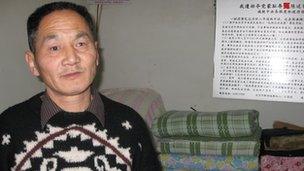
My home had been knocked down, my wife was depressed, and my kid had just been kicked out of school.
I attempted to commit suicide. I was in despair and threw myself into the Jinshui river.
As I jumped in, I shouted "My name is Ye Guoqiang, the government is treating me badly, I just want my rights."
The police got me out of the water and arrested me.
I was charged with disturbing public order and was given a two-year jail sentence.
The government should try to protect its people's legal rights, especially those of the poor. It should understand their situation and provide proper compensation.
Beijing - Yang Delu, villager-turned-businessman
I am from Wali, which is the current site of the Bird's Nest stadium and the Water Cube [Olympic Aquatics Centre].
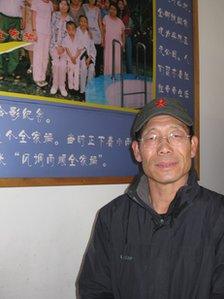
In the past, everyone in my family was a farmer, and before we were relocated, I was working in a factory repairing cars.
Thousands of people in Wali were relocated to make way for the construction of the Olympic stadiums.
The government offered compensation to us villagers.
Every household could get at least one million yuan ($160,000; £100,000).
Some people bought a new flat in a high-rise building with their money.
I didn't do that; I came here to Xiaotangshan in Changping district, and set up a museum about Wali and also a restaurant for visitors.
I wanted to memorialize our village of Wali in my own way.
People love to visit, to enjoy themselves, and learn what Wali was like.
I feel very fortunate that our land has been turned into the Olympic venues - it is very beautiful there, and everybody in the world now knows about this place.
Everybody was quite positive about the Olympics because the whole area was developed commercially for the better.
Rio - Janie Oliviera, favela dweller who faces eviction
I'm 55 years old, and I have lived in the community of Vila Autodromo [set for demolition] next to the motor sports stadium for 10 years.
The government is authoritarian - it dictates what it wants and barges and pushes.
If you are small in number, the government doesn't listen to you.
It seems like in every place which is privileged to host the Olympic Games, it's the poor working class people who suffer.
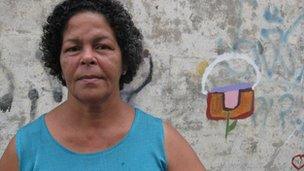
The original Olympics plan for this site took us into account, and allowed us to stay.
But now they want our land, and they think we are fools and don't realise this.
I see this as a war to exclude the poor and benefit the big businessmen.
Everyone uses the same word, 'land market'. If there is interest in the land, then the poor are not allowed to stay.
With these changes, we have a sense of loss.
Why are they moving us out if we want the games too? We also want to see our city being honoured.
Most of the athletes come from poor families, so why are the favelas being left out?
At the moment, when the motor racing goes on, many of the residents here get work.
So, when construction starts on the Olympic site - because we live so near - hopefully we can get jobs there too.
East London - Gileno Melo, works at a motorbike repair shop
I've been in this area for 13 years.
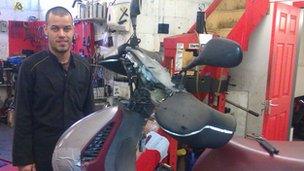
We had a bike shop and a workshop fitted. Our company was in a good location, but we didn't own the place, the building wasn't ours.
With the Olympics drawing near, they asked us to give over the site - they wanted to renovate and improve the housing there, so we had to move away.
They gave us notice to leave by a certain date. If we didn't leave by that time, everything left inside would be locked in with steel doors, like they did with other businesses.
We stayed as long as we could, and then we left.
If you go now, some places are still open, but they will probably be closed in a couple of months.
The compensation here was very high, which is why many cast aside their companies and closed their doors.
[But because we were renting] we didn't receive any compensation - nothing.
The government here wants somewhere more presentable, more attractive and cleaner for the Olympics.
The stories here form part of a documentary series looking at the Olympic legacy. You can listen to part one here. Part two will be broadcast on Saturday 28 January at 19:05 GMT on BBC World Service.
- Published27 July 2011
- Published1 July 2011
- Published5 March 2012